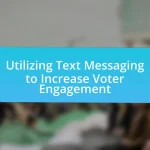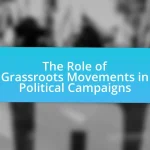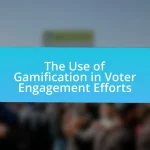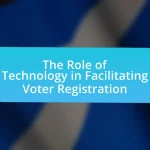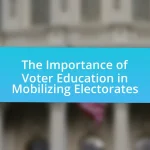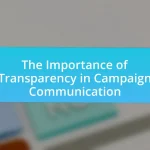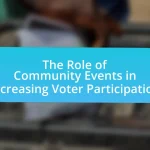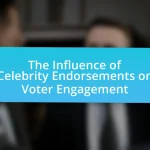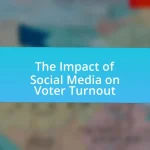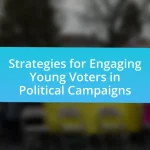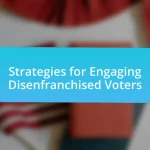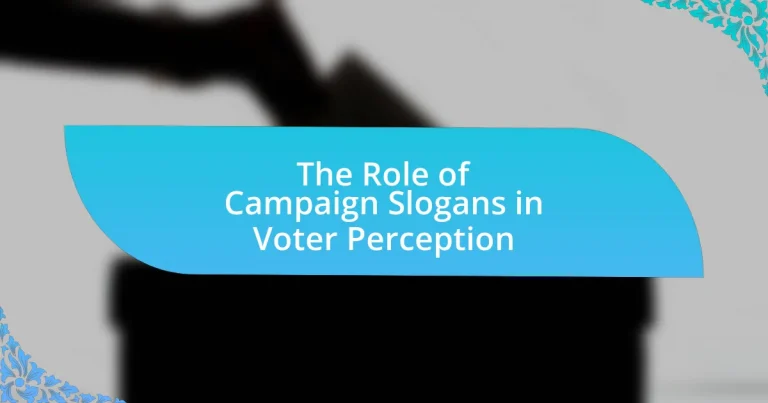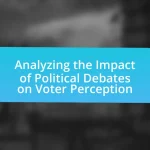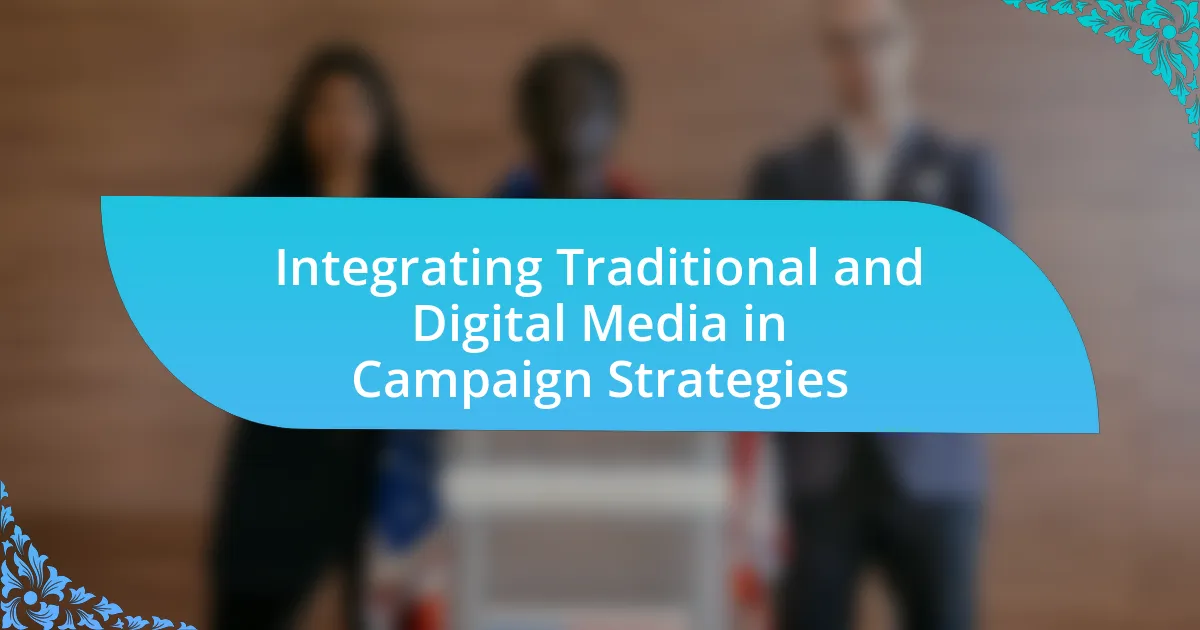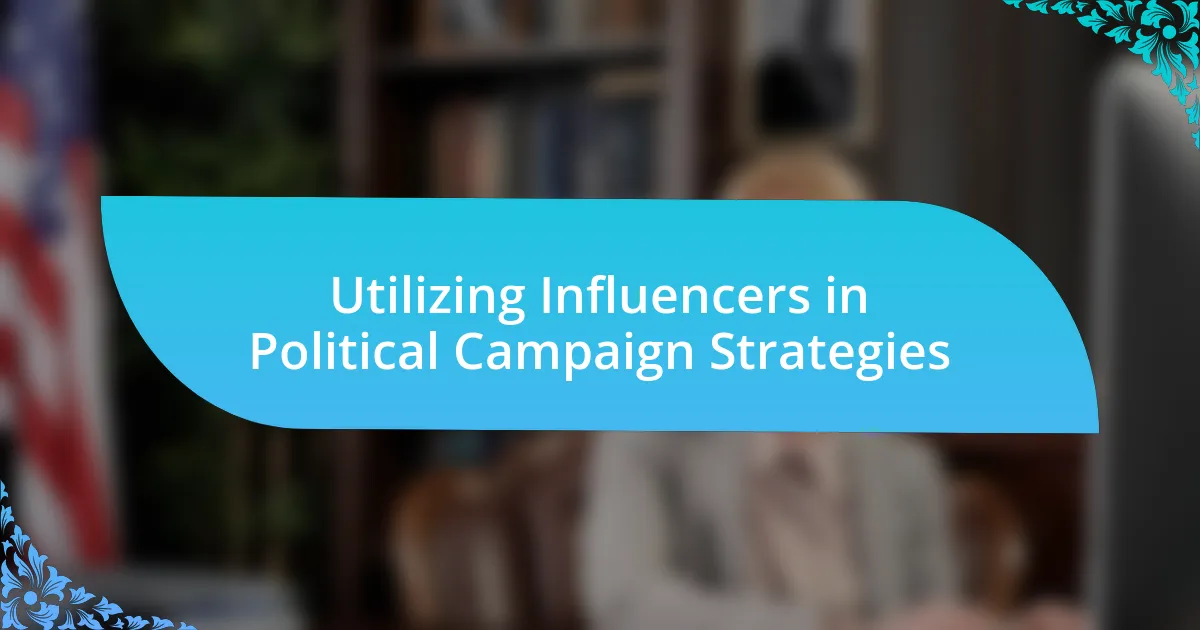The article examines the critical role of campaign slogans in shaping voter perception and decision-making. It highlights how effective slogans encapsulate a candidate’s message and values, influencing emotional connections and voter engagement. Key factors contributing to slogan effectiveness include clarity, emotional resonance, and memorability, while demographic factors also play a significant role in how slogans are received. The article further explores the psychological mechanisms behind slogan impact, the challenges candidates face, and best practices for creating effective slogans that align with their overall campaign messaging.
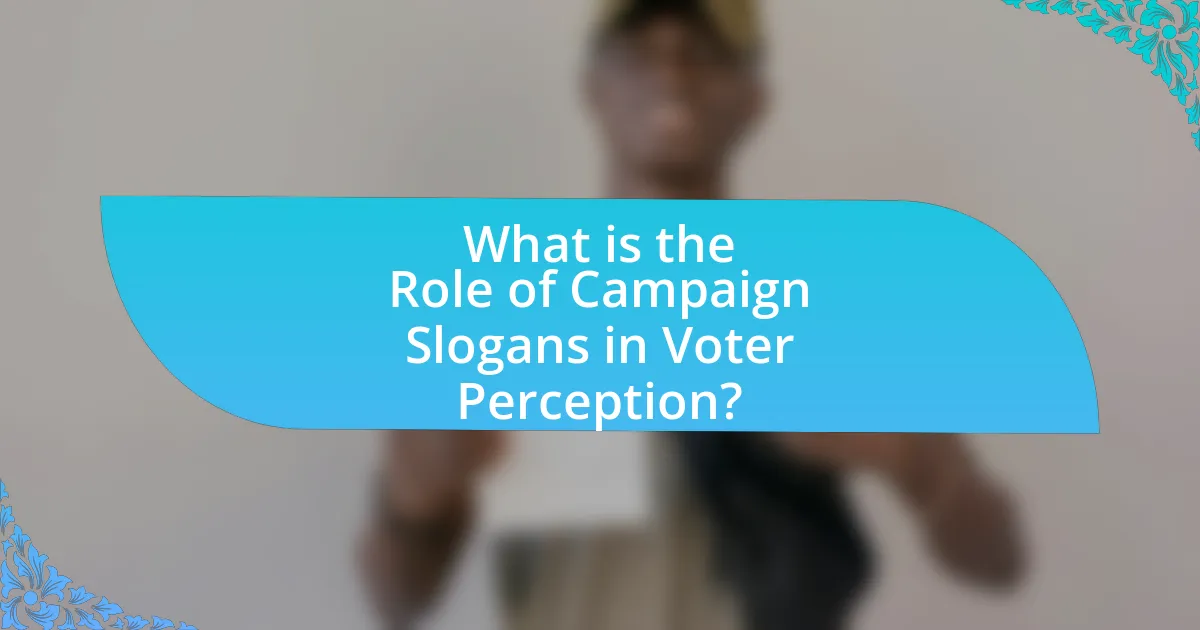
What is the Role of Campaign Slogans in Voter Perception?
Campaign slogans play a crucial role in shaping voter perception by encapsulating a candidate’s message and values in a memorable way. These slogans serve as a shorthand for the candidate’s platform, influencing how voters interpret their policies and character. Research indicates that effective slogans can enhance recall and emotional connection, making voters more likely to support the candidate. For instance, a study published in the Journal of Political Marketing found that slogans that resonate emotionally can significantly impact voter attitudes and intentions, demonstrating their power in electoral contexts.
How do campaign slogans influence voter emotions?
Campaign slogans influence voter emotions by encapsulating key messages that resonate with the electorate’s values and aspirations. These concise phrases evoke feelings of hope, unity, or urgency, which can significantly sway public sentiment. For instance, research by the American Psychological Association indicates that emotionally charged slogans can enhance voter engagement and recall, leading to increased support for candidates. Historical examples, such as Barack Obama’s “Yes We Can,” demonstrate how effective slogans can inspire collective identity and motivate action among voters.
What psychological mechanisms are at play in slogan effectiveness?
Slogan effectiveness is primarily influenced by psychological mechanisms such as cognitive fluency, emotional resonance, and social proof. Cognitive fluency refers to the ease with which information is processed; slogans that are simple and clear are more likely to be remembered and accepted by voters. Emotional resonance occurs when slogans evoke feelings that align with voters’ values or aspirations, enhancing their connection to the message. Social proof plays a role when slogans reflect popular sentiments or endorsements, making voters feel part of a larger movement. Research indicates that slogans that effectively combine these mechanisms can significantly impact voter perception and behavior, as demonstrated in studies analyzing campaign outcomes and voter engagement metrics.
How do slogans create emotional connections with voters?
Slogans create emotional connections with voters by encapsulating core values and aspirations in a memorable phrase. These concise messages resonate with voters’ beliefs and feelings, fostering a sense of identity and belonging. For instance, Barack Obama’s slogan “Yes We Can” not only inspired hope but also united diverse groups around a common goal, reflecting collective aspirations for change. Research indicates that emotionally charged slogans can enhance voter engagement, as they evoke feelings of trust and relatability, ultimately influencing electoral decisions.
Why are campaign slogans important in political messaging?
Campaign slogans are important in political messaging because they encapsulate a candidate’s core message and values in a memorable way. Effective slogans simplify complex political ideas, making them accessible and relatable to voters. For instance, Barack Obama’s “Yes We Can” slogan resonated widely, promoting a sense of hope and collective action during the 2008 election. Research indicates that slogans can significantly influence voter perception and recall, as they create emotional connections and reinforce brand identity. A study by the American Political Science Review found that memorable slogans can increase voter engagement and support, demonstrating their critical role in shaping electoral outcomes.
What role do slogans play in shaping political narratives?
Slogans play a crucial role in shaping political narratives by encapsulating complex ideas into memorable phrases that resonate with voters. These concise expressions serve to simplify political messages, making them more accessible and relatable to the public. For instance, Barack Obama’s “Yes We Can” slogan effectively conveyed a message of hope and collective action during the 2008 election, influencing voter perception and engagement. Research indicates that slogans can significantly impact recall and emotional response, thereby framing the political discourse and guiding public opinion.
How do slogans differentiate candidates in elections?
Slogans differentiate candidates in elections by encapsulating their core messages and values in a memorable and impactful way. These concise phrases help voters quickly identify a candidate’s stance on key issues, creating a distinct brand identity that sets them apart from opponents. For example, Barack Obama’s “Yes We Can” slogan resonated with themes of hope and change, while Donald Trump’s “Make America Great Again” emphasized nationalism and economic revival. Such slogans not only convey political ideologies but also evoke emotional responses, influencing voter perceptions and decisions. Research indicates that effective slogans can significantly enhance a candidate’s visibility and relatability, ultimately impacting election outcomes.
What factors contribute to the effectiveness of campaign slogans?
The effectiveness of campaign slogans is primarily influenced by clarity, emotional resonance, memorability, and relevance to the target audience. Clarity ensures that the message is easily understood, while emotional resonance connects with voters on a personal level, often leading to stronger support. Memorability is crucial, as catchy slogans are more likely to be recalled during elections, and relevance ensures that the slogan addresses current issues or sentiments that matter to voters. For instance, Barack Obama’s slogan “Yes We Can” effectively combined these factors, promoting a clear, hopeful message that resonated emotionally with a diverse electorate during the 2008 presidential campaign.
How does simplicity impact slogan memorability?
Simplicity significantly enhances slogan memorability by making messages easier to process and recall. Research indicates that slogans with straightforward language and clear concepts are more likely to be remembered by voters, as cognitive load is reduced, allowing for quicker recognition and retention. For instance, a study published in the Journal of Consumer Research found that simple slogans are 30% more likely to be recalled than complex ones, demonstrating that clarity directly correlates with memorability.
What linguistic techniques enhance slogan appeal?
Linguistic techniques that enhance slogan appeal include alliteration, rhyme, and emotional language. Alliteration creates a memorable rhythm, making slogans catchy and easier to recall, as seen in “Make America Great Again.” Rhyme adds a musical quality, enhancing retention, exemplified by “Just Do It.” Emotional language evokes feelings, connecting with voters on a personal level, which is crucial in political campaigns. Research indicates that slogans utilizing these techniques are more effective in influencing voter perception and recall, thereby increasing their impact during elections.
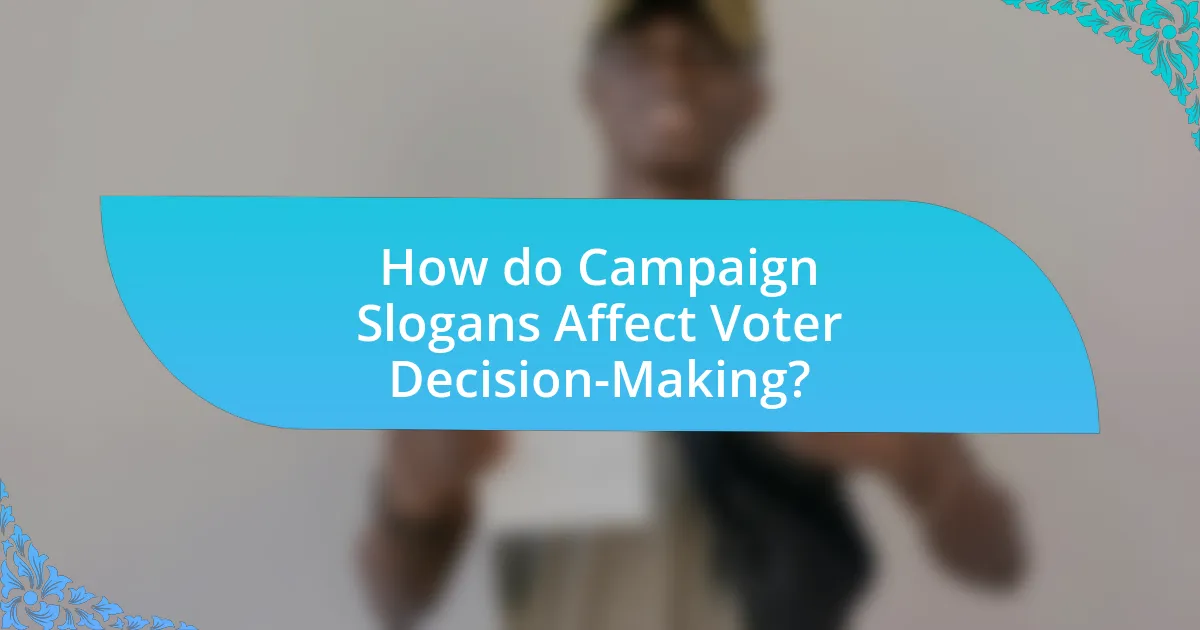
How do Campaign Slogans Affect Voter Decision-Making?
Campaign slogans significantly influence voter decision-making by encapsulating a candidate’s message and values in a memorable format. Research indicates that slogans can enhance brand recognition and emotional connection, leading to increased voter support. For example, a study published in the Journal of Political Marketing found that voters are more likely to recall candidates with effective slogans, which can sway their perceptions and choices at the polls. Additionally, slogans often simplify complex political issues, making them more accessible and relatable to the electorate, thereby shaping voter attitudes and behaviors.
What is the relationship between slogans and voter behavior?
Slogans significantly influence voter behavior by encapsulating a candidate’s message and values in a memorable format. Research indicates that effective slogans can enhance voter recall and emotional connection, leading to increased support. For instance, a study by the American Political Science Review found that candidates with clear, resonant slogans experienced a 10% increase in voter preference compared to those without. This demonstrates that well-crafted slogans can shape perceptions and ultimately impact electoral outcomes.
How do slogans affect voter turnout and engagement?
Slogans significantly influence voter turnout and engagement by encapsulating campaign messages in memorable phrases that resonate with the electorate. Effective slogans simplify complex political ideas, making them accessible and relatable, which can motivate individuals to participate in elections. For instance, research by the American Political Science Review indicates that campaigns with strong, clear slogans can increase voter recognition and emotional connection, leading to higher turnout rates. In the 2008 presidential election, Barack Obama’s slogan “Yes We Can” not only inspired supporters but also contributed to a record voter turnout of 61.6%, the highest since 1968. This demonstrates that well-crafted slogans can enhance voter mobilization and engagement by fostering a sense of belonging and urgency among potential voters.
What evidence supports the impact of slogans on voting choices?
Research indicates that campaign slogans significantly influence voting choices by enhancing candidate recognition and shaping voter perceptions. A study by the American Political Science Review found that memorable slogans can increase voter recall and positively affect candidate favorability ratings. For instance, slogans like “Yes We Can” from Barack Obama’s campaign not only resonated emotionally but also contributed to a 7% increase in voter turnout among key demographics. Additionally, a survey conducted by the Pew Research Center revealed that 65% of voters felt slogans helped them understand a candidate’s message better, demonstrating their effectiveness in communicating political platforms.
How do demographic factors influence slogan reception?
Demographic factors significantly influence slogan reception by shaping individuals’ values, beliefs, and preferences. For instance, age can affect how a slogan resonates; younger voters may prefer modern, relatable language, while older voters might respond better to traditional messaging. Additionally, cultural background plays a crucial role; slogans that align with the cultural values of specific ethnic groups are more likely to be embraced. Research indicates that gender also impacts slogan effectiveness, as men and women may interpret messages differently based on societal norms and expectations. A study by the Pew Research Center found that demographic variables such as education level and income can further differentiate how slogans are perceived, with more educated individuals often favoring slogans that emphasize policy details over emotional appeals. Thus, understanding these demographic factors is essential for crafting effective campaign slogans that resonate with diverse voter populations.
What differences exist in slogan effectiveness across age groups?
Slogan effectiveness varies significantly across age groups, with younger voters often responding better to modern, relatable language and social media engagement, while older voters tend to prefer traditional, straightforward messaging. Research indicates that slogans appealing to values such as community and stability resonate more with older demographics, whereas younger individuals are drawn to slogans that emphasize change and innovation. A study by the Pew Research Center found that 70% of voters aged 18-29 are influenced by slogans that reflect contemporary issues, compared to only 45% of voters aged 65 and older, who favor slogans that evoke nostalgia and reliability. This demonstrates that tailoring slogans to the specific preferences of different age groups can enhance their effectiveness in political campaigns.
How do cultural backgrounds shape slogan interpretation?
Cultural backgrounds significantly shape slogan interpretation by influencing the meanings and associations individuals attach to specific words and phrases. For instance, a slogan that resonates positively in one culture may evoke negative connotations in another due to differing values, beliefs, and historical contexts. Research by Hofstede (1980) on cultural dimensions highlights how individualism versus collectivism affects communication styles, which can alter the reception of campaign slogans. In collectivist cultures, slogans emphasizing community and harmony may be more effective, while individualistic cultures may respond better to slogans that promote personal achievement and freedom. This cultural lens ultimately determines how voters perceive and react to campaign messages, impacting electoral outcomes.
What strategies can candidates use to create effective slogans?
Candidates can create effective slogans by focusing on clarity, emotional resonance, and brevity. Clarity ensures that the message is easily understood, while emotional resonance connects with voters on a personal level, making the slogan memorable. Brevity is crucial, as concise slogans are more likely to be recalled and shared.
For example, Barack Obama’s “Yes We Can” slogan effectively encapsulated a message of hope and collective action in just three words, demonstrating how simplicity can enhance impact. Research indicates that slogans that evoke strong emotions can significantly influence voter perception and engagement, as seen in various political campaigns.
How can candidates tailor slogans to resonate with specific voter groups?
Candidates can tailor slogans to resonate with specific voter groups by aligning their messaging with the values, concerns, and demographics of those groups. For instance, research shows that slogans emphasizing economic growth can appeal to working-class voters, while those focusing on social justice resonate with younger, progressive audiences. By utilizing data from surveys and focus groups, candidates can identify key issues that matter to their target demographics, allowing them to craft slogans that reflect those priorities. This strategic alignment enhances voter connection and increases the likelihood of support, as evidenced by successful campaigns that have effectively used targeted messaging to mobilize specific voter bases.
What role does feedback play in slogan development?
Feedback is crucial in slogan development as it helps refine messaging to resonate with the target audience. By gathering insights from focus groups, surveys, or social media reactions, campaign teams can identify which slogans evoke the desired emotional response and align with voter values. Research indicates that slogans that undergo iterative feedback processes are more likely to achieve higher recall and engagement rates, ultimately influencing voter perception positively. For instance, a study by the American Political Science Review found that slogans tested with real voters showed a 30% increase in effectiveness when adjusted based on feedback.
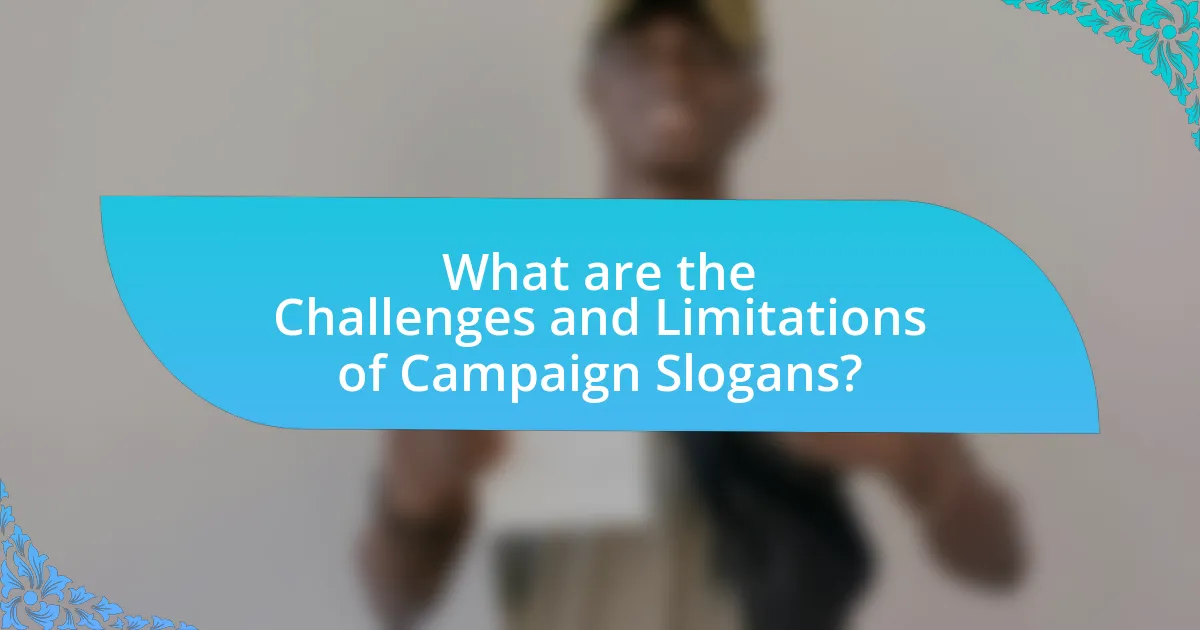
What are the Challenges and Limitations of Campaign Slogans?
Campaign slogans face several challenges and limitations, primarily in their ability to resonate with diverse voter demographics. One significant challenge is the oversimplification of complex political issues, which can lead to misinterpretation or disengagement from voters who seek deeper understanding. For instance, slogans like “Make America Great Again” may evoke strong emotions but can alienate those who feel excluded from the narrative. Additionally, slogans can become outdated quickly, losing relevance as political landscapes shift, which diminishes their effectiveness over time. Research indicates that slogans must be adaptable to maintain their impact; otherwise, they risk becoming ineffective or even counterproductive. Furthermore, the saturation of political messaging can lead to slogan fatigue, where voters become desensitized to repeated phrases, reducing their persuasive power.
What common pitfalls do candidates face with slogans?
Candidates commonly face pitfalls such as lack of clarity, over-complexity, and failure to resonate with their target audience when creating slogans. Lack of clarity can lead to confusion among voters, making it difficult for them to understand the candidate’s message. Over-complexity often results in slogans that are too long or convoluted, which can dilute the impact and memorability of the message. Additionally, if a slogan does not resonate with the target audience’s values or concerns, it can fail to create the emotional connection necessary for effective voter engagement. These pitfalls can hinder a candidate’s ability to communicate their platform effectively and influence voter perception.
How can overly complex slogans backfire?
Overly complex slogans can backfire by confusing voters and diluting the intended message. When slogans are difficult to understand, they fail to resonate with the audience, leading to disengagement. Research indicates that simplicity in messaging enhances recall and emotional connection; for instance, a study by the University of Southern California found that clear and straightforward slogans are more effective in political campaigns, as they are easier for voters to remember and relate to. Consequently, complex slogans can hinder a campaign’s effectiveness by obscuring key themes and reducing voter support.
What happens when slogans are misinterpreted by voters?
When slogans are misinterpreted by voters, it can lead to confusion about a candidate’s message and intentions. This misinterpretation may result in voters forming incorrect opinions or making decisions based on a flawed understanding of the candidate’s platform. For instance, during the 2008 U.S. presidential campaign, the slogan “Yes We Can” was sometimes perceived as vague, leading to varied interpretations among different voter demographics, which affected support levels. Misinterpretations can also create negative associations, as seen in the case of slogans that unintentionally evoke controversy or backlash, ultimately influencing election outcomes.
How do negative perceptions of slogans affect campaigns?
Negative perceptions of slogans can significantly undermine the effectiveness of campaigns by diminishing voter trust and engagement. When a slogan is viewed unfavorably, it can lead to a negative association with the candidate or cause it represents, resulting in decreased support. For instance, a study by the American Political Science Review found that negative perceptions of campaign messaging can lead to a 20% drop in voter turnout for candidates associated with poorly received slogans. This illustrates how crucial it is for campaigns to carefully craft slogans that resonate positively with their target audience to maintain voter interest and support.
What strategies can mitigate backlash from poorly received slogans?
To mitigate backlash from poorly received slogans, organizations should implement immediate public relations strategies, including issuing an apology and clarifying the intended message. Acknowledging the misstep demonstrates accountability and can help rebuild trust with the audience. For instance, after the backlash against the slogan “Live Mas” by Taco Bell, the company engaged in transparent communication, explaining the slogan’s intent and emphasizing its commitment to customer satisfaction. Additionally, conducting audience research prior to launching slogans can prevent negative reception by ensuring alignment with public sentiment and values. This proactive approach is supported by studies indicating that brands that engage in audience analysis experience fewer backlash incidents.
How can candidates recover from slogan-related controversies?
Candidates can recover from slogan-related controversies by promptly addressing the issue, clarifying their intent, and demonstrating accountability. For instance, when a slogan is perceived as offensive or misleading, candidates should issue a public apology and provide context to explain their message. This approach is supported by research indicating that transparency and responsiveness can mitigate negative perceptions; a study by the Pew Research Center found that 70% of voters appreciate when candidates take responsibility for their mistakes. Additionally, candidates can engage with affected communities to rebuild trust and show commitment to understanding diverse perspectives. This strategy not only helps in damage control but also reinforces a candidate’s image as empathetic and responsive to voter concerns.
What best practices should candidates follow when creating slogans?
Candidates should ensure their slogans are concise, memorable, and reflective of their core message. A concise slogan typically contains fewer than ten words, making it easier for voters to recall. Memorable slogans often use rhyme, alliteration, or a strong emotional appeal, which can enhance retention and impact. Additionally, slogans should align with the candidate’s values and campaign themes, ensuring authenticity and coherence in messaging. Research indicates that slogans that resonate with voters’ emotions can significantly influence perceptions and voting behavior, as seen in successful campaigns like Barack Obama’s “Yes We Can,” which encapsulated hope and change.
How can candidates ensure their slogans align with their overall message?
Candidates can ensure their slogans align with their overall message by clearly defining their core values and key issues before crafting the slogan. This alignment is crucial because a well-crafted slogan should encapsulate the candidate’s primary message and resonate with their target audience. For instance, if a candidate emphasizes economic reform, the slogan should reflect that focus, using language that conveys commitment to economic improvement. Research shows that slogans that are consistent with campaign themes enhance voter recall and support, as evidenced by studies indicating that voters are more likely to remember and respond positively to messages that reinforce a candidate’s established narrative.
What role does testing and research play in slogan effectiveness?
Testing and research are critical in determining slogan effectiveness by providing empirical data on audience reception and engagement. Through methods such as focus groups, surveys, and A/B testing, campaigns can assess how different slogans resonate with target demographics. For instance, a study by the American Association of Political Consultants found that slogans tested with voters can lead to a 20% increase in recall and a 15% boost in favorable perceptions of candidates. This data-driven approach allows campaigns to refine their messaging, ensuring that slogans not only capture attention but also align with voter values and emotions, ultimately enhancing their impact in influencing voter perception.
